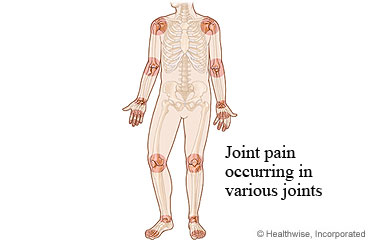
Your Care Instructions
Arthritis is a common health problem in which the joints are inflamed. There are many types of arthritis. In rheumatoid arthritis, the body's own immune system attacks the joints. This causes pain, stiffness, and swelling in the joints, especially in the hands and feet. It can become hard to open jars, write, and do other daily tasks. Sometimes rheumatoid arthritis can also cause bumps to form under the skin.
Over time, rheumatoid arthritis can damage and deform joints. Early treatment with medicines may reduce your chances of having a lasting disability.
Follow-up care is a key part of your treatment and safety. Be sure to make and go to all appointments, and call your doctor if you are having problems. It's also a good idea to know your test results and keep a list of the medicines you take.
How can you care for yourself at home?
- If your doctor recommends it, get more exercise. Walking is a good choice. If your knees or ankles hurt, try riding a stationary bike or swimming.
- Move each joint gently through its full range of motion once or twice a day.
- Rest joints when they are sore or overworked. Short rest breaks may help more than staying in bed.
- Reach and stay at a healthy weight. Regular exercise and a healthy diet will help you do this. Extra weight can strain the joints, especially the knees and hips, and make the pain worse. Losing even a few pounds may help.
- Get enough calcium and vitamin D to help prevent osteoporosis, which causes thin bones. Talk to your doctor about how much you should take.
- Protect your joints from injury. Do not overuse them. Try to limit or avoid activities that cause joint pain or swelling. Use special kitchen tools and other self-help devices as well as walkers, splints, or canes if needed.
- Use heat to ease pain. Take warm showers or baths. Use hot packs or a heating pad set on low. Sleep under a warm electric blanket.
- Put ice or a cold pack on the area for 10 to 20 minutes at a time. Put a thin cloth between the ice and your skin.
- Take pain medicines exactly as directed.
- If the doctor gave you a prescription medicine for pain, take it as prescribed.
- If you are not taking a prescription pain medicine, ask your doctor if you can take an over-the-counter medicine.
- Take an active role in managing your condition. Set up a treatment plan with your doctor, and learn as much as you can about rheumatoid arthritis. This will help you control pain and stay active.
When should you call for help?
Call your doctor now or seek immediate medical care if:
- You have a fever or a rash along with joint pain.
- You have joint pain that is so severe that you cannot use the joint at all.
- You have sudden swelling, redness, or pain in one or more joints, and you do not know why.
- You have back or neck pain along with weakness in your arms or legs.
- You have a loss of bowel or bladder control.
Watch closely for changes in your health, and be sure to contact your doctor if:
- You have joint pain that lasts for more than 6 weeks.
- You have side effects from your arthritis medicines, such as stomach pain, nausea, heartburn, or dark and tarlike stools.
Where can you learn more?
Go to http://www.healthwise.net/patientEd
Enter K205 in the search box to learn more about "Rheumatoid Arthritis (RA): Care Instructions".
Current as of: July 10, 2023
Author: Healthwise Staff
Clinical Review Board
All Healthwise education is reviewed by a team that includes physicians, nurses, advanced practitioners, registered dieticians, and other healthcare professionals.

